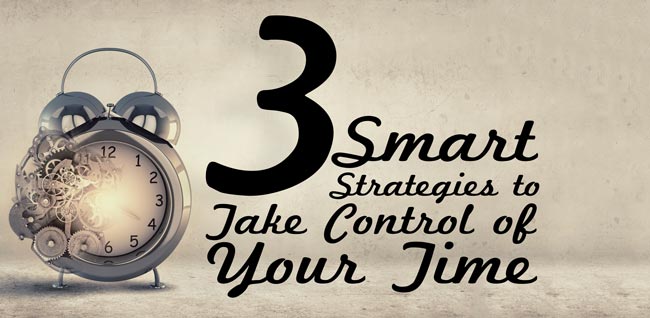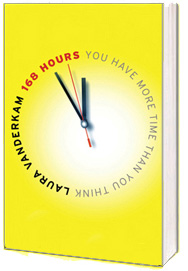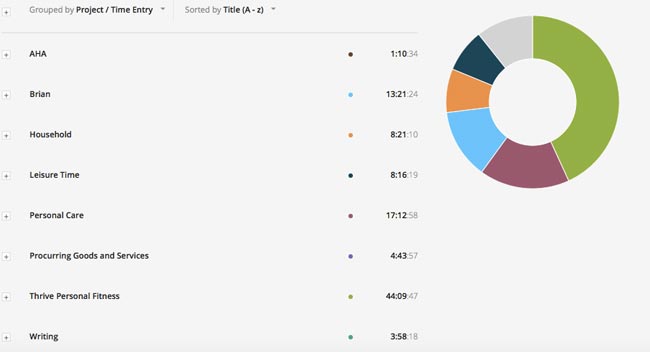168 hours.
That’s the number of hours in a week. It seems like a lot, doesn’t it?
So why are we all saying we don’t have enough time? I fall victim to this trap myself. I try to remind myself that it is all about priorities. I try to be honest and say,
It’s not a priority right now vs. I don’t have time for that.
Yet I can’t help but envy my friends’ Facebook posts about naps or reading a book a week. I wonder how they manage to do it when I wake at 5 am to get the laundry done, programs prepped and blog posts written. I feel lucky if I have some time to read when I get home. Except I haven’t seen Brian all day and picking up my book or a magazine feels like I am ignoring him.
What am I doing wrong?
At the recommendation of a friend I read the book 168 Hours: You Have More Time Than You Think by Laura Vanderkam. Vanderkam is not a time management guru, but a writer with a family who became interested in how we spend our lives. She wanted to understand the “time crunch crisis”. She wanted to explore what work-life balance really means in our constantly on the go and always connected world.
Her story starts like the fitness journeys I start with my clients. Her first chapters are about getting real with who you are and where you want to go. It’s about understanding where you are right now. Like with food, the first step in getting honest with your time is to track it.
For three weeks I tracked my time with Toggl. I looked at my life in different phases: a “normal” week, a week with more outside of the gym engagements and a week where Brian was traveling. I admit it was a pretty eye opening experience from the very beginning. Here is what I learned about my time:
-
I work a lot, but perhaps not as much as I thought.
I get asked all the time how many hours a week I work. I now have an answer. If you add up all the hours of actual work (training, prepping, marketing, writing, meetings, etc.) it comes to about 49 hours a week. That’s more than your average American adult (35-43 hours per week Vanderkam notes in her book) but perhaps not as much as I thought.
-
I am trying to do too many things at once.
We all have the illusion that we can multitask. We are all also wrong. The simple act of having to categorize my time made me stop and focus on one thing at a time. When I did that I felt like I got more done and I felt better doing it.
-
It’s hard to put life into neat categories.
I put exercise in PERSONAL CARE because to me it is like brushing my teeth. It is non-negotiable. Someone else might call it LEISURE. If I make a snack am I COOKING or is that only when I make a big meal for Brian and I? If Brian and I go to Target together is that SHOPPING or is that BRIAN time? Our attitude defines how we approach life. My attitude about tasks influenced if I defined them as work, maintenance or play.
-
I spend too much time in the weeds and not enough time looking forward.
Programs have to get written and the bills have to be paid. However, if I want to spread my message to even more people via motivational speaking and health education seminars I have to spend more time cultivating that skill. If I want to write more I have to WRITE MORE.
-
There is more time to connect with my husband than I think.
Being at the gym four nights a week sometimes makes me feel like I neglect Brian. The time study made me realize that’s not the problem. The problem is I am not always present when we are together. We have time at the end of the day; I just often choose to read instead. He sits with me while I brush my teeth at night but I choose to get into bed while he brushes his. He tries to talk to me I just often don’t stop to listen. Connection isn’t about quantity, it’s about quality.
-
Social media is a huge time suck.
I average about six hours per week on social media related to my business life. This does not include writing blog posts or social media for fun (checking out what my cousins are up to or going through Brian’s travel posts). I love interacting with my clients. I have alerts set up on most of my accounts so when someone posts I can see it. However, in the morning I don’t need to spend time reviewing every Instagram post since I went to bed. I don’t need to spend hours trying to find the perfect #TBT picture to post. I can still be part of the conversation but I don’t have to live my life online.
-
There is time to nap I just have better things to do.
I do have plenty of LEISURE time in my week; I just choose to spend it differently. My one good multi-tasking habit is to watch my favorite television shows on the treadmill or elliptical. That gives me time to read, journal and meditate at home. Sometimes I choose to read a magazine rather than a book. Sometimes I choose to watch basketball instead of a read a book. I have time for a book a week I just make choices that keep that from happening.
Now the question is what to do about it changing the things I don’t like about my 168 hours. My plan is a work in progress but here are my three strategies to help take control of my time.
-
Complete my 100 Dreams list.
This is an activity she recommends to help you figure out what you want to do with your life. Your goal is to list 100 things you want to do. It’s not a bucket list. It’s about understanding how you would spend your time, your life, in a perfect world. 100 is a lot of things but that’s on purpose. It frees you up to brainstorm as wildly as you wish. I know my WHY but I want to see if how I achieve my WHY might need some adjustment. I have time to do other things I just need to understand what it is I really want to do.
-
Review my core competencies.
Another recommendation from Vanderkam is to understand what you are good at and what you are not. I need to look at my strengths and maximize them. I need to find my weak links and outsource, delegate or automate them. Do we really need to hire someone to clean the house or do we just need a better system? Does online shopping really save me time and money or should I just schedule regular Target trips?
-
Stop multi-tasking so much.
As I write this, my email is closed. I cannot here the ding when a new one comes in. NPR isn’t playing in the background. Twitter is not open. This is a major adjustment to my constantly jumping brain. It feels weird but I also feel I am in more of a flow state as I put words to paper. This one may be the hardest of all but it may also lead to some of the best results.
I’ll let you know how it goes and what else I come up with in a few weeks.
Doing a time study is the Action Step in Chapter 3 of my new book, Motivation Is Made Not Found, on sale February 1! Sign up for my email list here and be one of the first to purchase it with a special subscriber only discount!





